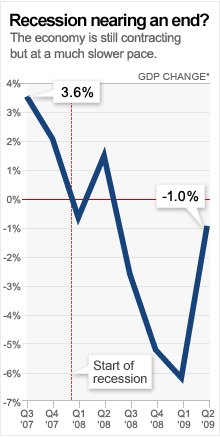Have we hit the bottom?
Experts vary in their opinions about whether the much smaller economic decline in the second quarter means the end of the recession.

NEW YORK (CNNMoney.com) -- A government report Friday showed that the economy is no longer falling off a cliff, but that doesn't necessarily mean we can slam the door on the recession.
The economy continued to contract, albeit at a much slower pace, in the second quarter. But since GDP is a trailing indicator, some say more evidence is needed before a bottom can really be called.
Ask three economists, get three different answers. And that's exactly what CNNMoney.com did. Read on and decide for yourself.
Rock bottom. "I'm pretty sure this was the bottom," said Sung Won Sohn, professor of economics at California State University. "Everything suggests that the worst is behind us, and in the second half of the year, we should see a positive GDP number."
Backing up that assertion, Sohn noted that the pace of contraction in every domestic category slowed to a near crawl last quarter. (The one exception was government spending, which rocketed higher.)
Businesses aren't cutting back by as much, housing appears to be bottoming, and the slowdown in manufacturing has slowed down.
Perhaps most importantly, consumer spending hasn't fallen off by as much as people feared and that may be the key, according to Sohn.
"Housing sales and prices will begin to rise, which will lead to a lot of consumer spending," he predicted. "And, remember, stimulus will be kicking in this quarter."
On the brink. Kurt Karl, head of economic research at Swiss Re, is on the fence.
"This [third quarter] is the transition quarter," said Karl. "We're right on the cusp -- it could go positive or negative, but we probably won't see a trough until September."
Karl said there won't be any more huge quarterly declines like we saw in the fourth quarter of 2008 and the first quarter of 2009, as some confidence has been restored. But the jobs, housing and credit situations still need to improve before the economy can really recover -- an unlikely scenario, he says.
"Neither the third or fourth quarters of this year should be strong given what we're still facing," said Karl. "We seem to be approaching the corner, but it's not a sharp corner."
One thing that could cause the third quarter to go positive is stronger auto sales, Karl argued. With the success of the Cash for Clunkers program, he expects automakers to ramp up production and sales, which could add significantly to GDP. The House voted Friday to extend the program by $2 billion, but a vote still looms in the Senate, where it could face opposition.
But that could be an artificial boost. And if the job situation doesn't improve by the end of the year, Karl wouldn't rule out a negative GDP reading for the fourth quarter.
Hold your horses. "This report points to a lot of things that suggest we're nearing bottom," said Bob Brusca, economist at FAO Economics. "But every component other than government spending contracted last quarter, so it's crystal clear that there's no recovery yet."
Brusca said it's too early to say whether we've hit bottom since GDP is a trailing indicator -- looking at the last quarter rather than the current economic situation. And since all of the data is still pointing downward, he said it's unfair to say the recession has ended.
He did say the fact that the pace slowed down is certainly encouraging. Brusca was especially heartened by the smaller decline in business inventories, which suggest the bottom is approaching. Still, he noted that businesses are on a pace to take a whopping $140 billion out of inventories this year, adding, "We're a far cry from businesses adding to their inventories."
"I like that [hitting bottom] story a lot," said Brusca. "But we've been sticking our necks out, saying, 'That's the last one' every quarter, and we've been wrong each time." ![]()

